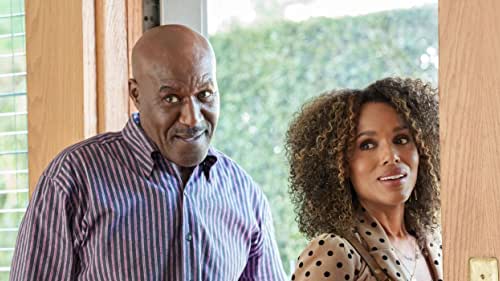Tracy McMillan is an expert on life’s extremes.
She’s known the highs and the lows. The middle part – the comfy, cozy part – has been elusive.
Well, she did grow up in Minneapolis, in mid-America. And she spent several years with a warm foster family, led by a Lutheran minister.
But then she was back with her charismatic dad, whom she’s described as “a Billy Dee Williams type who committed crimes for a living.” That led to “UnPrisoned,” debuting Friday (March 10) on Hulu. Kerry Washington and Delroy Lindo (shown here) play people a lot like McMillan and her dad. The difference is that in this fictional version, he lives with her after prison.
“I actually have two rules – don’t ask me for money and you can’t live with me,” McMillan told the Television Critics Association. But for the series, “I was like: ‘What would it have been like to have that healing of him coming to live with me?’ It’s just not something I was going to do in real life.”
The fictional dad charms friends and neighbors. That was always true in real life, McMillan said.
“People would meet my dad over the years and be like, ‘Well, what a nice man.’
“And I’m like, ‘Yeah, just because he spent time in prison does not mean he’s not a good person with a good heart.’” She hopes to change views of “people who have been affected by mass incarceration.”
McMillan, 58, has had plenty of successes – three marriages, a college-grad son, a career that has included being a journalist, an author, a relationship counselor (including five episodes of “Ready For Love”) and a scriptwriter. She’s written scattered TV episodes (including one for “Mad Men” and four for the young-superhero show “Runaways”) and a TV movie, “Pride & Prejudice: Atlanta.”
But each marriage ended in divorce. Stable homes have been scarce.
Her mother, she once wrote in an essay, was “a 20-year-old Minnesota girl with a really bad drinking problem,” who promptly left. Her dad, Freddie (who died recently) “did surprisingly well as a primary caregiver, despite his busy schedule pimping and drug-dealing.”
But he went to prison when she was 3, leading to foster homes, including the comfortable years with the Lutheran minister. Freddie emerged when she was 8; she spent the next decade with him and/or his girlfriend … who raised her after he was sentenced again.
The next time he go out, she wrote, she “had a nice, MBA-type boyfriend …. We moved to California, settled down, and I ‘forgot’ all about my crazy childhood.”
Except she didn’t. One day, she phoned and revived a cross-country relationship. This was “someone I could call, any time of day or night, who was unconditionally accepting and who would generally have something wise to say. He could also be counted on to flirt with my friends, but I forgave him for that.”
Now a version of him is being played by Lindo, 70, a film giant. “Delroy is quite literally one of reasons that I am an actor,” Washington said. She recalled seeing the him in “Malcolm X,” playing Malcolm’s crime mentor. “It changed my idea of what was possible as an actor. The magic that he created onscreen and the arc of that character just really transformed me.”
Lindo has played plenty of criminals, plus cops, a powerful politician and the head of a major law firm. Lately, he said, there’s been an emphasis on re-framing Black stories.
“’The Harder They Fall’ and ‘Five Bloods’ were what I called historical correctives.,” Lindo said. “And this, in it’s own way, is a present-day corrective.”
It’s McMillan, perhaps, correcting her view of a dad who was always there, even though he wasn’t.

In or out of prison, he was a warm dad
Tracy McMillan is an expert on life’s extremes.
She’s known the highs and the lows. The middle part – the comfy, cozy part – has been elusive.
Well, she did grow up in Minneapolis, in mid-America. And she spent several years with a warm foster family, led by a Lutheran minister.
But then she was back with her charismatic dad, whom she’s described as “a Billy Dee Williams type who committed crimes for a living.” That led to “UnPrisoned,” debuting Friday (March 10) on Hulu. Kerry Washington and Delroy Lindo (shown here) play people a lot like McMillan and her dad. The difference is that in this fictional version, he lives with her after prison. Read more…